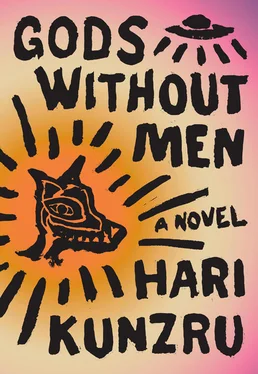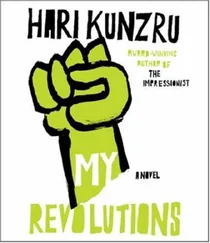He worked obsessively. On the physical level, energy and matter were tractable; unlike higher-order phenomena such as girls, their difficulties could be tamed by formulae. His SAT scores were exceptional, and one day he found himself walking across the MIT campus wearing a wide batik tie and one of Uncle Malkit’s old suits, expertly altered by Seetal so it had looked, to the tastemakers on the family couch, quite stylish. Whether it was his manic determination or his impeccable minority credentials, the admissions board was impressed, and amid family rejoicing, he was offered a full scholarship, on condition he maintained his academic performance. The eagle had landed.
One September morning, with his waist-length hair wrapped in a bright pink turban, a garland round his neck and a tikka mark on his forehead, he was taken to the station in his uncle Inderpal’s cab and put on the train to his new life. His mother was already putting the word out for a bride.
In Cambridge, the first thing he did — before looking for his dorm, before registering for classes — was find a barber. He was determined that his student ID would have a new person on it, the one who lay in bed that first night running his fingers over his buzz-cut bristles, feeling the unfamiliar shape of his skull and trying not to cry. The next day he falteringly began to invent a different character, more suitable than Jaswinder Singh Matharu to inhabit the domes and towers of a university campus. As Jaz — no family name — he avoided the desi scene, stayed away from the speed-dating, the cultural societies — anything that might remind him of the shame he was trying to outrun. His roommate Marty took it upon himself to introduce him to activities he’d previously seen only in the teen comedies he’d rented back home in Baltimore. Together they shotgunned beer, smoked pot and went to rowdy parties where people dressed up in bedsheets or bathing suits and groped one another in upstairs bedrooms. At one of these parties Jaz lost his virginity to a girl called Amber, who was just like the goris he’d always dreamed about, except paralytically drunk on Red Bull and vodka. Afterward he thought he was in love and followed her around for a couple of weeks, until she told him to stop, explaining that what they’d done was a “onetime thing.” He asked Marty what this meant. Nothing good, bro, was the answer. Jaz told himself she was nothing but a gandi rundi, a filthy whore like all white girls.
In this way, most of his first semester passed before he had to face his parents and show the Punjabi world what he’d done. His cousin Jatinder was getting married in Philadelphia. He had to attend. No excuses. At least, he told himself, it would get the whole thing over with in one shot. His arrival at the reception, held in a banquet room at a hotel, was dramatic. Uncle Malkit, taking a call outside, didn’t recognize him at first. When Jaz said hello, Uncle Malkit’s eyes widened. His parents were literally speechless. Instead of hugging him, his mom held him at arm’s length, a stricken expression on her face. His father wouldn’t even shake his hand. Later, he followed Jaz into a restroom and grabbed his collar, his face contorted with anguish. For a long time he struggled for words. Jaz wondered when he was going to hit him. “You look like a thug,” he whimpered, then let him go.
His sister’s husband, Baldev, was deputized to give him the lecture. He hoped Jaz was happy. He hoped it felt good spitting in the faces of his parents, who’d slaved every day, who’d made such sacrifices. So proud of him, but the minute he left home he’d thrown away his religion. He was a grown man; it was his decision. Baldev understood how hard it was to keep to one’s culture, especially in this maderchod Amrika. But couldn’t Jaz see how cruel he was being? He’d killed something inside his maa; he’d trampled on his father’s honor. How could the old man hold his face up in the community now that his son was no better than those black gaandus who ran around behaving like monkeys, fighting and making trouble? Jaz muttered something about finding his own path, a phrase much on his mind at the time.
After Jatinder’s wedding, he threw himself into guilt-ridden study. He stopped going to parties, abstained from drinking and, apart from his weekly trips to the barber, tried to go back to being the good Sikh boy who appreciated his parents’ sacrifice. His mother eventually broke the silence, phoning him to ask if he was coming back for the vacation. No, he told her. He had work to do. He promised to see the family as much as his studies permitted, but for the next couple of years his visits were few and far between.
Marty, never the most sensitive of souls, didn’t really understand the change in his party apprentice. He and Jaz grew apart. In his second year Jaz found different friends. He read European novels and bought a lava lamp. Day and night, he wore a pair of John Lennon glasses with purple lenses. He’d sit under a tree, pretending to read, desperately hoping to be distracted. In this way, he met his first real girlfriend, a gothy biology major called Lynsey who seemed to accept him as a tortured intellectual. They were together almost two years. The simple things they did — going camping, eating in restaurants — convinced Jaz there really was something worthwhile about the larger America, something richer than his hormonal fantasies.
The family found the new Jaz hard to understand. He was dimly aware he made everyone uncomfortable by reading The New York Times at the breakfast table, commenting acidly on Bill Clinton or Bosnia. If he’d been able to put it into words, he would have said he was trying to broaden their horizons. One summer he worked double shifts in his cousin Madan’s convenience store, then got a passport and went to Europe with friends. When he came back, he drove home, and without thinking went downtown to a deli, bought a few things and stashed them in his mom’s fridge. It wasn’t just the strange food (a Camembert and some sliced mortadella) that outraged her; it was the invasion of her space, the implicit criticism of her mothering. Her son was in her house: It was her job to feed him. Jaz was angry that she threw his stuff in the trash. Then he remembered where he was. Even heating a can of beans would have been a provocation.
He had his vacation pictures developed and showed his dad the Eiffel Tower, the Brandenburg Gate. He expected him to be interested, or at least proud that his son had visited such exotic places. He tried to make him laugh by repeating some mildly spicy Italian phrases he’d learned in Naples, but the old man just looked dejected. At the time Jaz interpreted it as disapproval. Later he realized it was a kind of mourning; he was sad because he couldn’t connect himself with this image of his smiling crop-haired son, wearing shorts and a T-shirt, clinking glasses with sunburned white boys over plates of steak frites.
Lynsey broke up with him. She wanted, she said, to be part of his life, but he kept shutting her out. He tried to tell her it wasn’t like that. How could he explain the impossibility of taking a gori back home, let alone introducing one as his girlfriend? None of his friends had met his parents. The few times his mom and dad made the trip up to MIT, he hustled them off campus as fast as possible. He endured a torturous lunch and took them to see the sights in a rental car. They were polite and attentive, but the feeling of relief when it came time for them to leave was obviously mutual.
And so his compartmentalized life continued. He stayed at MIT for grad school, partly because it deferred the moment when he’d have to choose a career. He’d always been more interested in theory than experiment, and his adviser steered him toward the field of quantum probability, where he worked on reconciling competing mathematical descriptions of the physical world, attempting to understand life at a scale where precision dissolved into indeterminacy.
Читать дальше












